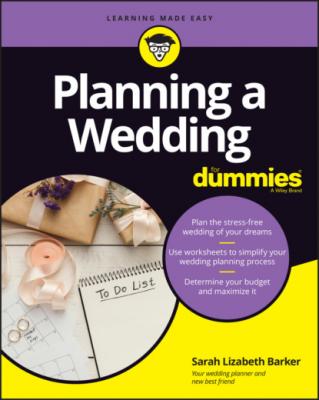Planning A Wedding For Dummies. Sarah Lizabeth Barker
Чтение книги онлайн.
Читать онлайн книгу Planning A Wedding For Dummies - Sarah Lizabeth Barker страница 21

Before you start researching your vendors, you need to determine what you have to spend. Let’s face it — weddings are expensive. That doesn’t mean you can’t have everything you want; it just means you need to be intentional with what you have to spend. Before you fall in love with an expensive photographer or design elaborate flower arrangements, it’s important to determine your budget.
You’ve probably already checked the resources to determine a percentage of what each item should be in your overall budget. This is my biggest pet peeve in the wedding industry; those percentages were created to be a guide, but they are not yours. One thing that was forgotten when those standard percentages were created is you!
That’s right — you decide what your budget will be. In this chapter, we’ll determine what’s most important to you, figure out who’s paying and what you have to spend, work out what your budget should include, and look at something often overlooked in the overall budget: additional fees and tips and gratuities.
Knowing What’s Most Important to You
I’m sure you have attended your friends’ weddings. What did you love? What did you dislike? Did you notice the fancy china? Do you remember what you ate? What color were the flowers? What did the linens look like? Did they have paper napkins or cloth napkins?
In Table 3-1, write in some of the things you loved about your friends’ weddings and some of the things you disliked. This will help you see how much you remember about other weddings you have attended. Focus on the details to help you determine your own loves and dislikes.
TABLE 3-1 Loves/Dislikes from Your Friends’ Weddings
| Your Loves | Your Dislikes |
|---|---|
Looking over this list, are you surprised by how much you didn’t remember? I’m not. Now, if you just attended a wedding last week, chances are you remember a lot. But if it’s been over six months, you may have struggled to recall any of the details.
The point in doing this is to remind yourself that, when you design your budget, no one will remember what they had to eat; they’ll only remember if it was good. No one will remember who your DJ is; they’ll only remember if they were entertaining. No one will remember if you had white polyester tablecloths or designer linens; they’ll only remember if the tables were covered.
Now it’s your turn. In Chapter 4, we’ll pick your top five vendor categories, but for now focus on what’s most important and least important to you on your wedding day. In Table 3-2, fill in the pieces that are most important to you when you think about your wedding day.
TABLE 3-2 Your Most Important/Least Important Parts of Your Wedding Day
| Most Important | Least Important |
|---|---|
For example, you’re a lover of food so the food must be top notch; you don’t really care if you have a video so a videographer is low on your list; you want an amazing dress that makes you feel incredibly beautiful; you’re not a fan of stationery and want simple invitations; you want your guests to dance all night long so an amazing DJ or band is a must-have. We’ll customize your budget soon to fit your needs and desires for the big day.
I had a client who wanted simple flowers and must have told me that a thousand times during our planning meetings. She didn’t even like flowers and would often break out because she was allergic. Somewhere along the way, someone in her life told her she needed extravagant florals. But why would she need elaborate flower arrangements if she didn’t want elaborate flower arrangements? Was it to impress the guests? Why do we do that?
How did it end up for my client? She overspent on flowers and ended up with a lovely case of hives on her wedding day. All to make someone else in her life happy.
Figuring Out Who’s Paying
If I was a gambler, I would bet on the fact that talking about or asking for money isn’t your favorite thing to do. Most people don’t want to ask for financial help, which makes you normal. When planning a wedding and determining your budget,